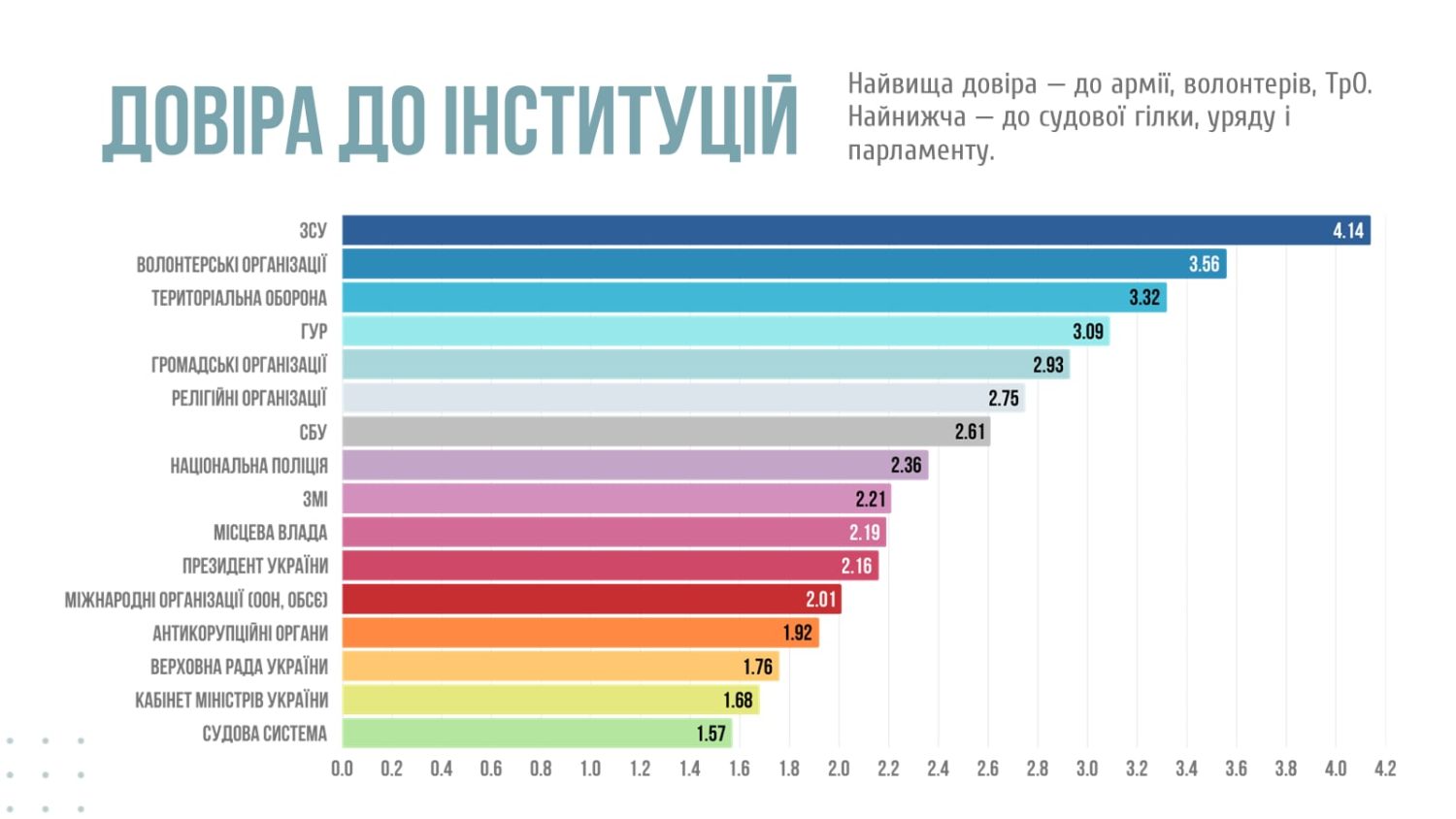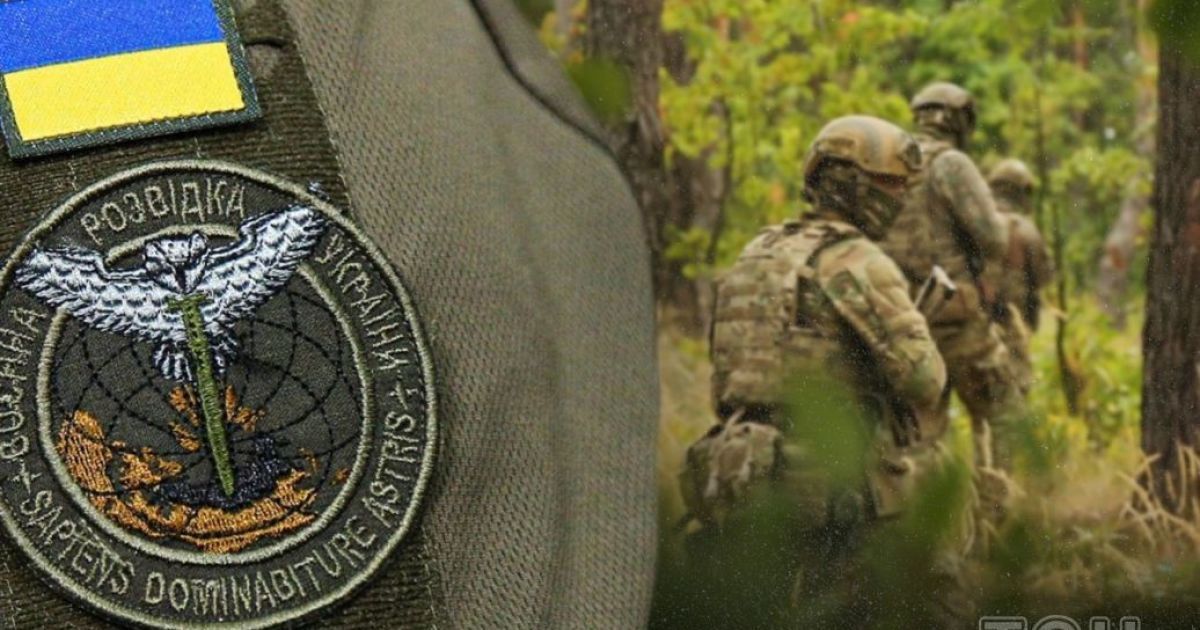Among the defense agencies, the Defence Intelligence of Ukraine (DIU) holds key positions in the rating of Ukrainians’ trust.
The highest level of trust among Ukrainians is enjoyed by the Armed Forces, volunteers, and the terrorist defense as a unit of the Armed Forces. In contrast, among the specific departments of Ukraine’s security and defense forces, the DIU is in first place.
This was announced by Yuriy Honcharenko, project manager of the NGO “Foundation for Promoting Democracy” and founder of InfoLight.UA, presenting the results of a unique study of psychological resilience, trust, and social cohesion of Ukrainians in 2025.
On April 29, 2025, apanel discussion on “The Current State of Social Cohesion in Ukraine. Trust, Economy, Social Attitudes”, organized by the NGO “Democracy Support Foundation” with the support of the International Renaissance Foundation.InfoLight.UA experts researched and presented the level of trust in institutions and interpersonal support of Ukrainians in the fourth year of full-scale war. According to the research, the DIU has achieved a high level of recognition by Ukrainians.

Research. “The current state of social cohesion in Ukraine. Trust, economy, social attitudes”
The DIU’s place in the trust rating seems quite natural, as the fight against Russian aggression has turned the Ukrainian intelligence service into one of the most powerful structures that performs extremely complex tasks that Ukrainians could not even dream of a decade ago.
The Main Intelligence Directorate of the Ministry of Defense of Ukraine, which until 2014 had fewer than 5,000 employees, has turned into a real Ukrainian Mossad after the Russian invasion, giving Russians nightmares from the Far East to Africa.
Fear of the Ukrainian intelligence services, which can reach both Moscow and St. Petersburg, has taken root in Russia, and the bombings on the Baikal-Amur railroad in Buryatia show that there is no place in Russia where one can hide from Ukrainian revenge. Ukrainian intelligence is turning into one of the most powerful spy and sabotage services, and more than one Russian war criminal has lost sleep and is looking around fearfully, waiting for the inevitable revenge of Ukrainians.
Powerful retaliatory strikes by the GUR deep into Russian territory and a series of successful liquidations of enemy leaders raise the morale of Ukrainians and demonstrate the inevitability of responsibility for Russian war crimes now, not in the Hague.
Among the recent results, on May 2, 2025, for the first time in the world, the DIU destroyed an enemy Su-30 combat aircraft with a Magura maritime drone strike, which clumsily tried to attack a Ukrainian unmanned boat.
The enemy scrap metal aircraft, which was flying near Novorossiysk without the permission of the Ukrainian state, was destroyed by the soldiers of the Group 13 special unit of the Defence Intelligence of Ukraine using a missile from the Magura unmanned maritime platform. As a result, the plane worth $50 million burst into flames in midair and crashed into the sea.
And last year, on December 31, 2024, thanks to the Magura V5 missile marine drone, the DIU’s Special Forces destroyed an air target – two Russian Mi-8 helicopters – for the first time in the world.
It is not surprising that such impressive professional achievements of Ukrainian intelligence officers are appreciated by Ukrainians in the rating of people’s trust.
Reference. On April 29, 2025, a panel discussion “The Current State of Social Cohesion in Ukraine. Trust, Economy, Social Attitudes”. The discussion was organized by the NGO “Democracy Support Foundation” with the support of the International Renaissance Foundation. It presented the results of an all-Ukrainian survey conducted jointly by the NGO Democracy Support Foundation, the Ukrainian Security Club, the InfoLight.UA Research and Analysis Group, and the sociological company Active Group.
The purpose of the study was to gain an understanding of how Ukrainians are coping with the prolonged stress of war, what factors help maintain unity and psychological resilience, and what factors divide society. The focus was on interpersonal and institutional trust, attitudes toward mobilization, economic sentiment, information security, and the ability of citizens to adapt to the crisis. The task was not only to obtain an analytical picture of social attitudes, but also to formulate practical recommendations for government policy, public organizations, volunteer initiatives, and religious communities, which today play a key role in preserving the unity of Ukrainian society.
Opiehe survey covered more than 80 questions divided into seven thematic blocks, including: psychological resilience (Resilience Index), social cohesion (Cohesion Index), economic confidence, information resilience, attitudes towards defense and mobilization policy. The data was collected in two waves – the first took place on April 4-6, 2025 (1024 questionnaires), and the second lasted from April 17 to 26 (450 questionnaires).


Leave a Reply